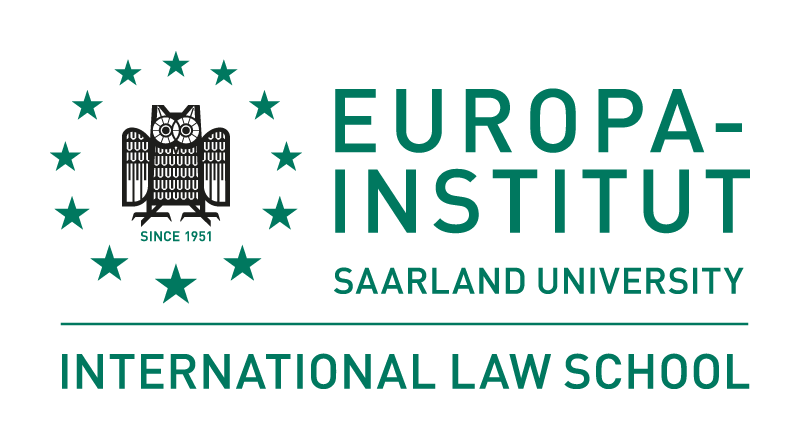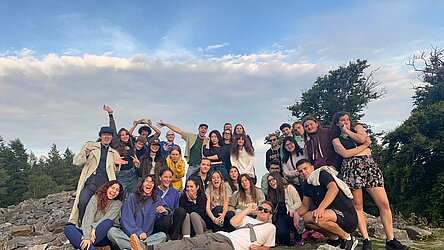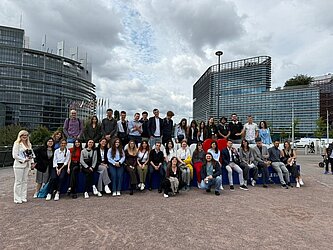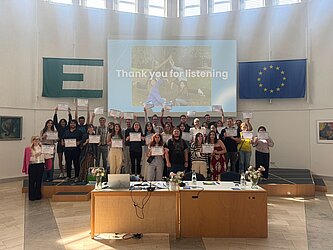
European Summer Course 2025: #NextGenEU: The EU as a Global Actor for Integration, Equality and Engagement

Over the course of ten days, participants from across Europe and beyond gathered in Otzenhausen to explore how the European Union can act globally for integration, equality and engagement. The programme combined academic insight, institutional visits, and intercultural learning.
From 28 July to 6 August 2025, the European Summer Course took place at the European Academy Otzenhausen, jointly organised by the Europa-Institut of Saarland University, the European Academy Otzenhausen, and the Centre for European Studies (CEUS). Under the title
#NextGenEU: The EU as a Global Actor for Integration, Equality and Engagement,
40 participants from across Europe and beyond explored the European Union’s global role through a diverse and intensive ten-day programme.
The course began with a welcome session and an intercultural communication workshop led by the seminar team. The following days combined academic input, hands-on learning, and field visits:
On 29 July, the focus was on human rights, including an introduction to the European human rights protection system by Prof. Dr. Thomas Giegerich LL.M. (Europa-Institut), followed by a case-based workshop led by Norah Kibaka-Vibila LL.M. and Dipl.-Jur. Mika Schieffer.
30 July was dedicated to European integration and institutional structures, featuring two sessions by Dipl.-Jur. Sebastian Ramelli LL.M. (Team Europe Direct, European Commission Representation in Germany) on EU policy objectives, institutional functioning, and decision-making processes, complemented by an interactive simulation.
On 31 July, participants travelled to Strasbourg to visit the European Parliament, followed by a guided tour through the European Quarter and a city rally focusing on Strasbourg's intercultural identity. The day concluded with a historical walking tour titled “Strasbourg – a Franco-German city.”
From 1 to 2 August, attention turned to the theme “The Time of War and Disorder: Navigating Conflicts and Populism in the 21st Century”. In multiple sessions, Prof. Yossi Mekelberg (Chatham House) and Dr. Robert Stewart (Luxembourg) discussed current geopolitical challenges and facilitated interactive workshops. On 2 August, an excursion to Trier, Germany’s oldest city, was followed by a wine tasting in Longuich.
3 August addressed the intersection of AI regulation and human rights in a presentation by Mag. iur. Meltem Yildirim LL.M. (Europa-Institut). In the evening, participants explored the Celtic Circular Wall Otzenhausen, connecting European history with ancient understandings of lifestyle and human dignity.
On 4 August, the group travelled to Saarbrücken for a session on the EU’s raw materials policy and its global implications, led by Dipl.-Jur. Fabienne Barke and Xenia Asta Penka LL.M., followed by a presentation on Germany as a study and work destination by Regi Salataj LL.M. (Europa-Institut/T4EU). In the afternoon, participants visited the UNESCO World Heritage Site Völklingen Ironworks.
5 August focused on EU enlargement and the Union’s global attractiveness. Dr. Mareike Fröhlich (Europa-Institut) facilitated a simulation on accession dynamics and foreign policy implications. The day concluded with a farewell dinner.
The course concluded on 6 August with participant presentations titled “Our Visions4aNewEurope”, followed by a final evaluation and wrap-up by the seminar team.
The European Summer Course 2025 offered a unique platform for academic exchange, political debate, and intercultural dialogue, equipping participants with deeper insights into the European Union’s internal structures and external impact.


